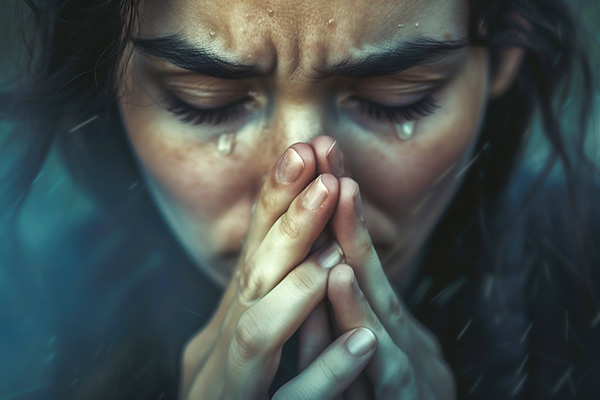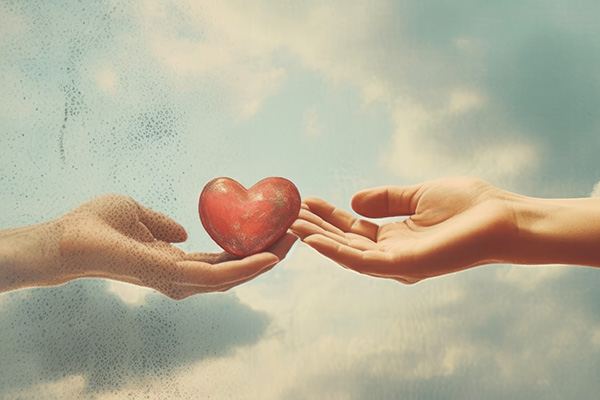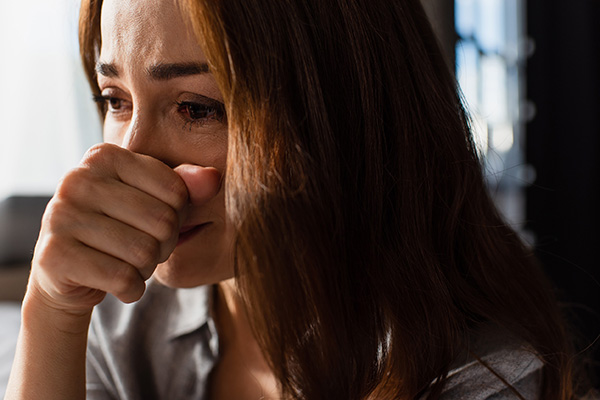emotional distress
Being Laid Off Can Spark Spiritual Growth
 Being laid off from a job can be a profoundly challenging and disorienting experience. The experience tends to stir up a myriad of feelings, worries, and questions about one’s purpose, value, security, and direction in life.
Being laid off from a job can be a profoundly challenging and disorienting experience. The experience tends to stir up a myriad of feelings, worries, and questions about one’s purpose, value, security, and direction in life.
But while job loss can be very unsettling and stressful, it also offers unexpected opportunities for personal and spiritual growth.
At its core, the spiritual journey invites us to explore the depths of our being and to seek meaning beyond the material realm. A layoff can serve as a catalyst for this exploration, prompting us to reevaluate our priorities, values, and relationship to work.
In many spiritual traditions, adversity is seen as an opportunity for growth and transformation, a chance to deepen our connection to the divine and uncover hidden aspects of ourselves.
Being fired is an invitation to surrender to the flow of life. In our modern society, we often cling to our plans and expectations, believing that we are in control of our destiny. However, a layoff can shatter this illusion of control and force us to confront the uncertainty and impermanence inherent in existence.
In the face of this new uncertainty, we have the opportunity to surrender our ego and trust in a higher power or cosmic intelligence to guide us on our path. This surrender is not an act of resignation, but rather an act of faith, a willingness to let go and allow life to unfold as it will.
Recognizing When A Relationship Is Over
 Every relationship serves a purpose and has its own timeline. When a relationship has served its purpose and is no longer contributing positively to our personal growth, happiness and soul evolution, acknowledging that it’s over opens a door to new possibilities and opportunities for healing, growth and expansion.
Every relationship serves a purpose and has its own timeline. When a relationship has served its purpose and is no longer contributing positively to our personal growth, happiness and soul evolution, acknowledging that it’s over opens a door to new possibilities and opportunities for healing, growth and expansion.
But while recognizing that a relationship is over is crucial for our personal well-being and spiritual growth, it is also very difficult for many people to face the truth when they see the writing on the wall. I find this to be a common problem that comes up in many psychic readings.
Staying in a relationship that has run its course is often detrimental to one’s health and well-being. It leads to stress, anxiety, loss of self-confidence, and a sense of being stuck or unfulfilled. Recognizing when it’s time to let go allows us to prioritize our own joy, happiness, and well-being.
Recognizing the end of a relationship is a lesson in acceptance and surrender. It encourages us to trust the universal flow, embrace change, and set new and better intentions to manifest our highest good. It is also an opportunity for deeper self-reflection and karmic growth.
When it comes to recognizing that a relationship is over, it’s important to listen to your intuition and inner guidance. The universe and our higher selves always give us subtle hints or nudges to show us when it’s time to let go and move forward on our personal and spiritual path.
Recognizing the signs that a relationship is over takes courage, self-awareness, and a willingness to prioritize personal well-being and growth. It’s a transformative process that ultimately fosters greater self-love, resilience, and spiritual evolution.
Always Feel Free To Own Your True Feelings
 Has anyone ever told you that you are too happy? Or has anyone ever told you that you smile too much? My guess is probably never.
Has anyone ever told you that you are too happy? Or has anyone ever told you that you smile too much? My guess is probably never.
So, why is it that whenever we experience negative emotions, be it grief, despair, or depression, we are often told that there is a time limit to such feelings and that we need to get over it. In today’s society, it is essentially also taboo to express feelings of loneliness, sadness, fear, or simply being unhappy.
My brother died at the tender age of 12 and left such a void in our lives that my entire family grieved his loss for decades. Fortunately, we were raised to accept this as a perfectly normal and natural process for us. We all understood that we would work through our feelings of grief and loss in our own way and at our own pace. We did not grieve according to a schedule or set of societal rules.
I find that a useful way to think about feelings and how to process them is to think of our emotions as being processed by our heart and mind like food is processed by our body. Just like food, we need to break down, digest, and assimilate the lessons and insights in our emotions to serve as growth “nutrients” for the soul.
An Empath’s Intervention Can Save A Life
 This morning after I finished meditating, instead of logging on to work as usual, I felt intuitively guided to visit a local coffee shop that I had visited a few days before.
This morning after I finished meditating, instead of logging on to work as usual, I felt intuitively guided to visit a local coffee shop that I had visited a few days before.
While I was there I had noticed a girl working there who seemed extremely sad. Her aura clearly showed me this. I also intuitively saw that she had probably been crying before she came in that day.
While waiting for my order, I tuned into her energy field to see what information I could get to help her, even indirectly. Normally I would not do this in public, but this poor girl really tugged at my heartstrings for some reason.
I immediately had more intuitive flashes about her and her boyfriend. I saw him being very mean, controlling and abusive to her, and also cheating on her with numerous women.
I also realised that she was living with him instead of him. I had a strong feeling that if she stayed there with him, things would get really bad in the long run – to the point where she might even have to go to a refuge for victims of domestic violence.
But as we did not know each other, I did not feel it was my place to interfere by giving her unsolicited advice. Nor did I want to embarrass her or myself! So I just prayed for her in silence and sent her some healing energy, but kept my premonitions and insights to myself.
Replace Nighttime Overthinking With Morning Clarity
 As night falls and the world quiets down, our minds often do the opposite. Many of us find ourselves caught in a relentless tide of overthinking as we replay the past and stress about the future. This mental whirlwind of worry can leave us feeling mentally foggy and emotionally drained, far from our true selves.
As night falls and the world quiets down, our minds often do the opposite. Many of us find ourselves caught in a relentless tide of overthinking as we replay the past and stress about the future. This mental whirlwind of worry can leave us feeling mentally foggy and emotionally drained, far from our true selves.
But within all this turmoil lies a powerful opportunity for personal growth and empowerment. How is this possible? Well, the key to ending the constant spiral and realigning ourselves with our highest good lies in cultivating greater intuitive awareness and mental clarity.
Overthinking at night is a common problem for many of us. In the silence of the night, after being on autopilot all day, our overactive minds become a breeding ground for worry, fear, and regret. Over time, this leads to a vicious cycle of anxiety and insomnia, which leads to more stress the next day, which leads to more anxiety and insomnia the next night, and so on.
The results are not only that we feel constantly tired and energetically drained, but we also lose our sense of self and connection to our soul purpose. Feeling energetically drained and disconnected from our authentic selves, we begin to question our choices and direction in life, leading to increased anxiety and decreased self-esteem. It becomes a very toxic spiral that is devastating to our physical, mental, emotional and spiritual well-being!
Why Do Empaths And Sensitives Often Feel Drained?
 Have you ever left a meeting or social gathering feeling completely drained or energetically depleted?
Have you ever left a meeting or social gathering feeling completely drained or energetically depleted?
Or maybe you’ve walked out of a store or other public place and noticed that you were short with your loved ones and irritable? Or you come home in the evening feeling sad or depressed for no apparent reason, after starting the day feeling cheerful and happy?
If this happens to you often, it is very likely that you are an empath or a highly sensitive person.
Empaths and highly sensitive people (HSPs) often feel drained by other people, social gatherings, crowds and certain environments due to several key aspects of their inherent nature and the way they interact with the world around them. Here are the major reasons for this phenomenon:
Genetic predisposition: Research suggests that the trait of high sensitivity is influenced by genetic factors that affect how individuals process sensory information and emotional stimuli. A key aspect of this genetic influence is the way the brain processes serotonin, a neurotransmitter that helps regulate mood, appetite, sleep, and sensory perception. Variations in genes related to the serotonin transporter have been linked to differences in emotional reactivity and sensitivity to the environment. Studies have shown that individuals with certain variations of these genes may exhibit traits consistent with high sensitivity, such as deeper cognitive processing of sensory information, higher emotional reactivity, and increased empathy.
Exploring The Benefits Of Reiki Healing
 Reiki healing offers a variety of potential benefits for both your physical and mental well-being. Reiki teaches that when our life force is high, we feel happy, radiant and vital, and when it is low, we feel sick, drained and stressed.
Reiki healing offers a variety of potential benefits for both your physical and mental well-being. Reiki teaches that when our life force is high, we feel happy, radiant and vital, and when it is low, we feel sick, drained and stressed.
Reiki is a form of energy healing in which practitioners use their hands to channel life force energy to the recipient. This universal energy or life force flows through all living things and is called ki in Japanese. The concept is similar to qi (or chi) in Chinese culture and prana in Indian culture.
A qualified Reiki healer is trained to channel healing energy to balance the flow of your life force energy and return you to a state of harmony and vitality.
Reiki has grown in popularity in recent years. Once viewed with skepticism by mainstream medicine, there’s a growing openness to complementary therapies, and Reiki is seen as a gentle and relaxing practice.
In today’s fast-paced world, stress is a major concern. Reiki’s reputation for promoting relaxation and reducing stress makes it attractive to many. Celebrities like Angelina Jolie, Nicole Kidman, Sandra Bullock and Gwyneth Paltrow and any mothers have spoken openly about their use of Reiki, giving it a touch of glamour and social validation.